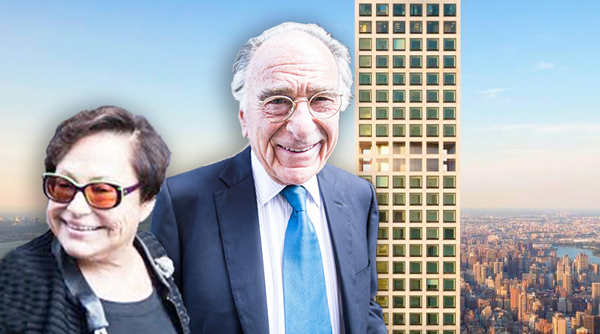You might think Donald Trump being sworn in as POTUS would overshadow all other real estate storylines in 2017. But you wouldn’t be giving the industry enough credit.

Donald Trump (credit: Getty)
There were earthquakes on all fronts. Zillow made its most aggressive moves yet to monetize StreetEasy, and in the process changed the power dynamics in the residential world. Compass continued to raise unprecedented amounts of money, as did WeWork. Political shifts across the world, most notably in China and the Middle East, impacted the foreign capital inflows into New York. And a certain “long in the tooth Lothario” got divorced, putting a question mark on his multibillion-dollar empire.
The Real Deal’s reporters hit the phones, pressed the palms, dived into data and even made treks to China to capture all the action. Here’s a look at some of the hottest stories to hit TheRealDeal.com in 2017.
Listings made StreetEasy
StreetEasy turned the city’s residential brokerage community on its head when it announced a new advertising feature on its for-sale listing pages. Brokers denounced the new feature as a pay-to-play program. The backlash was so intense that the Real Estate Board of New York asked state regulators to look into whether the program violated advertising laws.
StreetEasy then rolled out “Premier Broker,” a program that would allow brokerages to purchase buyer leads in bulk. In June, it managed to strike deals with the likes of Corcoran Group, Douglas Elliman, Nest Seekers International and BOND New York. But not everyone was convinced. “We are shocked that any credible brokerage firm in NYC would — at the corporate level — support such an unethical, misrepresentational program,” Brown Harris Stevens president Bess Freedman said of the alliance.

The Death Star
StreetEasy also rolled out a daily fee for posting rental listings on its site, and the number of listings subsequently plummeted. Though Corcoran and Citi Habitats cut off StreetEasy from their feeds, Elliman decided it was a “smart business decision” to buy into the new program.
The new initiatives not only exposed just how dependent the brokerages were on StreetEasy, but also shed a light on what can happen in a city that doesn’t have a formal Multiple Listing Service.
On Aug. 1, REBNY finally answered the call when it launched the Residential Listing Service (Disclosure: TRD and REBNY are partners on a property listings portal), a backend portal that disseminates listings to consumer-facing websites. BHS, Town, Compass and Stribling stopped sending their listings to StreetEasy, after the Zillow-owned portal said it would not accept REBNY’s new feed. Warburg Realty, Leslie J. Garfield, Kleier Residential and Fox Residential followed suit two days later — though not all brokerages would stick to the boycott.
This is all happening as national competitors such as Rupert Murdoch’s Realtor.com are gunning for a slice of the real estate listings business. “We’re going to make a better product,” Murdoch has said about Realtor.com. “Then when we’re satisfied we have a better product, we’ll get out and market it hard.”
A double unicorn
Well, it’s the end of 2017 and we’re still talking about Compass.
If brokers aren’t chirping about the firm’s sky-high valuation, they’re complaining about its aggressive recruiting tactics. Mauricio Umansky, president of Beverly Hills-based firm the Agency, told The Real Deal in April that the brokerage will be out of business in five years. Douglas Elliman chair Howard Lorber later disagreed that it “wouldn’t take that long to happen.”
In just four short years, the firm has raised $775 million in venture capital, becoming the first residential brokerage to be valued at north of $1 billion. In November, it secured $100 million in venture funding, propelling it to a $1.8 billion valuation. Shortly after, the firm announced that Japanese mega-investor SoftBank would invest $450 million at a valuation of $2.2 billion.
Compass plans to use its dollars to achieve its goal of 20 percent market share in the country’s top 20 cities.

From left: Robert Reffkin, Ori Allon and Masayoshi Son (Photo illustration by Lexi Pilgrim for The Real Deal)
It’s trying to achieve this even as it’s yet to fully find its new development footing in New York and is navigating a somewhat uncertain luxury market.
The brokerage could be also be gunning to go public. Online real estate brokerage Redfin made its Wall Street debut in July, where its stock price soared 45 percent from $15 to $21.72. Real estate insiders say the success or failure of Redfin’s IPO could be a major indicator of how tech-centric brokerages raise cash in the future.
WeWorld
Between planning a private elementary school and investing in wave pool technology and companies like Meetup.com, the co-working company was raising money, money, money. In August, it scored $4.4 billion from SoftBank, valuing at over $20 billion – that’s more than real estate investment trusts like Boston Properties and Vornado Realty Trust.

Adam Neumann
One of the more interesting stories to come out this year was that of its first investor, Joel Schreiber. The obscure Brooklyn real estate investor reportedly offered the pair a $15 million investment in 2010, which WeWork co-founder Miguel McKelvey said helped fuel their early success. Schreiber is regarded as a controversial figure in New York’s real estate community — investors have accused him of cheating them out of deals.
The major question heading into 2018 is whether co-working will remain the core of WeWork’s business. In recent months, the firm shifted away from smaller players to a more corporate clientele (think IBM at 88 University Place and Amazon at 2 Herald Square), and raised several hundred million dollars with private equity firm Rhone Group for a real estate investment fund. In October, the joint venture purchased Lord & Taylor’s Fifth Avenue flagship for $850 million. And there’s talk of a brick-and-mortar retail platform, as well.
Oh yea, and a potential IPO, too.
Till divorce and capital gains taxes do us part
Even as Harry Macklowe’s Supertall 432 Park Avenue racked up the records, the developer’s personal life reached new heights of drama.

432 Park Avenue, Linda and Harry Macklowe
Set off in part by his affair with a younger woman, the pair endured a 14-week court battle where Harry’s real estate empire was dissected in order to determine what he’s worth and what his soon-to-be ex is owed. Throughout the trial, Harry downplayed his assets, even pegging his personal net worth at negative $400 million. Also exposed were the developer’s stakes in various commercial and residential projects, Like 1 Wall Street, the retail portion of 432 Park Avenue And 200 59th Street. Though Linda’s lawyers say the developer is poised to make $55 million per year between 2017 and 2021, Harry’s team claims Macklowe Properties is projected to lose money every year. Check out all of the behind-the-scenes action.
It’s fitting the saga would wind down at 432 Park, where Linda and Harry squabbled over his-and-hers apartments.
Croman gets cuffed, and landlords shiver
Steve Croman, one of the city’s biggest multifamily landlords, pleaded guilty to felony charges of grand larceny, tax fraud and a third fraud charge stemming from filing a false instrument. The plea agreement included a $5 million tax settlement and a one-year jail stint. In December, Croman agreed to pay a record $8 million in restitution to the tenants he harassed — the largest ever settlement of its kind in New York.
While tenant advocates celebrated Croman’s sentencing as a victory against dubious landlords, property owners feared a larger crackdown on the industry. The City Council already introduced a package of bills aimed at expanding the definition of tenant harassment and increasing penalties for landlords. New York Attorney General Eric Schneiderman proposed state legislation to strengthen rules against tenant harassment a month later. Would the crackdown blur the lines between honest and shady property managers?

Steven Croman
The campaign to root out the bad eggs escalated in August, when Public Advocate Tish James announced the city would add lenders to its controversial “worst landlords list.”
I-sales take a hit
The city’s investment-sales market received a lifeline when Chinese conglomerate HNA Group acquired 245 Park Avenue for $2.2 billion, one of the priciest-ever deals for a Manhattan skyscraper. The purchase would be one of the few bright spots in 2017. In the third quarter, investment sales in Manhattan were on pace to be lower than they were in 2008 when Lehman Brothers collapsed.
In an environment like this, all brokers come under scrutiny — including the dynamic duo of Doug Harmon and Adam Spies. The team defected from Eastdil Secured to join Cushman and Wakefield in 2016, and have fallen behind their rivals at CBRE this year. Harmon and Spies have picked up momentum recently, however, due in part to the $850 million sale of Starrett City. Sources told The Real Deal their performance is integral to Cushman’s plans to go public — a move its competitor Newmark Knight Frank made in December.
Get me Brad Zackson!
Paul Manafort has become one of the most scrutinized men in the country as a central figure in Special Counsel Robert Mueller’s investigation into the Trump administration’s ties to Russia. But even as the investigation picked up heat, Manafort was busy trying to put together real estate deals. His partner on these grand ventures was Brad Zackson, a veteran but little-known figure in New York real estate.
In August, The Real Deal uncovered Zackson’s business relationship with Manafort and examined some of the duo’s more ambitious projects, including a play at the Drake hotel site (now 432 Park), and an attempt to bring a Chinese billionaire construction magnate into potentially sensitive U.S. infrastructure projects.
All the world’s a stage
Foreign investment has long been a driving force in New York real estate. But recent global political turmoil has affected the way overseas capital is moving into the market.
A regulatory crackdown in China is making it harder for Chinese nationals and companies to move their money out of the country. Chinese buyers are finding it more difficult to close on residential deals, while institutional players have backed off on bids for trophy properties. HNA Group, Fosun International and Anbang Insurance Group — all household names in New York due to their monster deals here — are among five firms that China’s banking regulator is investigating.
In March, Anbang backed out of negotiations to redevelop 666 Fifth Avenue, which Kushner Companies was bandying about at an other-worldly $12 billion valuation. Steve Roth, whose Vornado Realty Trust owns a partial stake in the office portion, said Kushner’s plans to convert the property into a multi-billion-dollar condo and retail tower “are not feasible.”
Qatari investment, which has been such a major force in the market for the past few years, is also up in the air following a feud with its neighbors in the Gulf. And then there’s Saudi Arabia, where the crown prince has inverted the traditional power structure in the kingdom. Among the blue bloods affected is Al Waleed Bin Talal, a key investor in The Plaza Hotel.
With some of the heavyweights climbing out of the ring, local players have had to get more creative to put together the cash for deals. One model that’s risen in popularity is syndication, as TRD explored in December. The investment model allows for a large pool of investors to get in a on deal without the with publicity and scrutiny of being a lead buyer. Though it’s not without its challenges.

